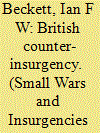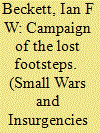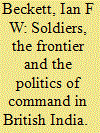| Srl | Item |
| 1 |
ID:
116260


|
|
|
|
|
| Publication |
2012.
|
| Summary/Abstract |
The article aims to offer a survey of the historiographical analysis of British counter-insurgency practices and campaigns since the publication of Armed Forces and Modern Counter-insurgency, edited by the author and the late John Pimlott in 1985. It is argued that the volume in question was influential at a time when there was little academic interest in counter-insurgency in Britain. Moreover, the subject generally had been little studied in Britain in the past beyond work by a handful of military writers and theorists. Arguably, the analytical framework followed in Armed Forces and Modern Counter-insurgency holds its value even after over a quarter of a century. Since the 1980s, however, it has become apparent that the subject is of increasing academic interest, not least in terms of the ongoing debate on the nature and application of the concept of 'minimum force' in British campaigns.
|
|
|
|
|
|
|
|
|
|
|
|
|
|
|
|
| 2 |
ID:
168215


|
|
|
|
|
| Summary/Abstract |
What Rudyard Kipling called the ‘campaign of lost footsteps’ was the longest campaign fought by the Victorian army. The conquest of Upper Burma, an area of 140,000 sq. miles with a population of four million, took only three weeks in November 1885 and was accomplished with minimum cost. However, the removal and deportation of the Burmese King and dismantling of all traditional authority dismantled led to growing resistance to British rule leading to an increasingly difficult guerrilla war. Though the Burmese guerrillas were characterised by the British as mere bandits or dacoits, many were former soldiers along with Buddhist monks. The extremely difficult nature of campaigning in the terrain and climate of Burma was not sufficiently appreciated by the War Office, who viewed the conflict as a ‘subaltern’s war’ and ‘police’ work. Intended regime change was also not accompanied by any consideration of the likely implications. Prolonged insurgency necessitated deploying a force far larger than originally intended; though order was finally secured by 1895, the campaign proved destructive of Burmese society while British recruitment of hill tribes into the police and armed forces sowed the seeds for future divisions.
|
|
|
|
|
|
|
|
|
|
|
|
|
|
|
|
| 3 |
ID:
065409


|
|
|